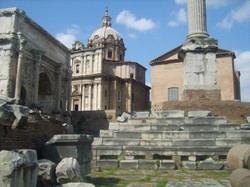There is no ethical consensus in Western societies, for there is a clash between different visions of ethics. Secular humanistic ethics asserts itself against Christian and other religious ethical thought. At the root of this difference of opinion is a disagreement about the nature of reality, a difference which includes differing understandings of human nature and its relationship with God. While not intending to resolve any major ethical issues here, I want to elucidate the differences of thinking behind ethical issues and aspire that this elucidation will enlighten participants in ethical discussion.

Natural Law Ethics
by frankbeswick
Natural law is at the basis of the Catholic understanding of Christian ethics
Differing positions
Some years ago when teaching Philosophy to eighteen year old college students I asked them to identify an act which was wrong in all circumstances, both wrong in itself and which could not be justified by any good consequences. The students correctly identified rape as the wrongful action. The class contained atheists, agnostics and a Mormon, being taught by a Roman Catholic. Despite our differences, we could all agree that there were certain actions that were wrong, these being murder, theft, lies, rape and so on. But there are issues that are trickier. Much of sexual ethics and all the issues around gender cannot be resolved so easily. They certainly cannot be settled as straightforwardly as the condemnation of rape can be. But dialogue on these issues in our society is often pointless, as no one is getting to the roots of the issues. The basis of the disagreement is differing conceptions of reality and the place of humans in it. I intend to identify some of this difference.
Secular, humanist ethics is based on a world-view in which humans are seen as predominantly or entirely material. There is no soul and no life beyond this one. Furthermore, there is nothing sacred about human nature, there is no God who addresses it and makes any call or demands upon our wills. Humanist ethics is based on the notion that what individuals are legally free to do is right as long as they do not harm others. Thus in the gender issue, a male is legally free to self-identify as a female, so he is female, and vice versa.
Christian ethics is divided into two broad positions, Protestant and Catholic, which differ in their view of human nature. The Protestant view is that human nature was totally flawed by the sin of Adam and therefore that no ethical conclusions can be derived from it. From sinful nature comes only sin and error .All reliable ethical teaching, according to this view, comes from the Bible, which contains God's revelation of what is right and wrong. Karl Barth, a great Protestant theologian, modified this view somewhat by arguing that after Christ was incarnated his Spirit was present in the world and so all humans could hear his call and feel his influence. This explains the fact that people outside Christianity can be ethical, which Protestant ethics does not. But it does not explain that there was non-Christian ethics in other religions before Christ.
The Catholic view is that though nature is flawed by original sin, the flaw was not total and we still contained a built-in goodness which is present as an aspect of all being. Natural reason was not lost and could be used to access ethical truths. This in-built goodness accessible by reason is the source of the natural law, a corpus of ethics rooted in created being.This natural law makes the whole of creation responsive to the call of God.
In creating the universe God has a purpose and calls all beings to participate in it according to their nature. Some beings do so in an involuntary way, animals for instance, for they are bound by the limitations of their nature. Humans, though, have the freedom to respond to God's call and can defy his will. The basis of this idea is that every being has a natural purpose according to its nature. Part of this nature is our individuality, which gives us a specific purpose within the general purpose of our natures.
For example, my male nature has made me a father, but my individuality involves a specific set of talents. I am not called to be an artist, as I have no talent for art, but I am called to write. Recognizing the strengths and limitations of my nature is essential to recognition of God's purpose for my life. Fulfilling this purpose is not an arbitrary decision,it determines the success or otherwise of my life on Earth.
The Natural Order
Natural Law ethics has its roots in the thinking of Aristotle, the philosopher whose works inspired St Thomas Aquinas, the great mediaeval Catholic thinker. For Aristotle nature was created by a deity [not one resembling the Christian God] who acted as a final cause for all actions. The final cause is an end [telos] to which all creation tends. Thus God was first cause [creator] and final cause, beginning and end. He creates with a purpose and draws all beings towards himself as the fulfillment of that purpose.
Aquinas took Aristotle's view and concluded that the nature of every kind of being reflects in some way the divine nature, in a way a sparkle of the glory of God. Some beings reflect it more than others do, and humans of all the beings on this Earth, the most. But humans are male and female, and each in some sense reflects the divine glory differently. Aquinas' view of females was benign, but misguided, as he reflected the views of his time in thinking that women were less able than men, but he thought that men should treat them in a kindly way. While we approve the latter opinion, we have moved beyond the former.
The role of religion in the natural law process needs to be elucidated. It is clear that Aquinas and Catholicism accepts that natural law is available to all humans irrespective of their faith, be they Christians, Hindu or non-believers. But Catholicism believes that religion gives the advantage of knowing the source of the law and so making it easier to understand. Not only does Christian faith make knowledge of the source of law easier, the moral strength that it provides enables us to avoid the self-deception that makes us convince ourselves that right is wrong when it suits us to do so.
Yet Catholicism allows that religion can provide extra guidance or laws, which are called divine positive law. For example, the mediaevals argued whether polygamy was against the natural law or not, as certain men of the Old Testament, such as Abraham and David, were polygamous. Some thinkers argued that polygamy was banned under divine positive law, but others called the ban a remote precept of natural law, not obvious at first and certainly not central to natural law, but one made clear by the Christian faith.
The significance of natural law.
The significance of natural law theory is that not only does it constitute a good foundation for ethics, but it forms a defence against some of the serious defects in ethical thought that are currently being promoted in Western societies. An error that seems to be doing the rounds is that ethical issues can be reduced to the principle that individuals are free to do as they like with their own bodies. While legally this is correct, it is not the end of the issue, for natural law ethics points out that being legally free to do or think anything is not the same as being right, and the order of nature stands over and against your choices. For example, I am legally free to consider myself a tall, handsome, athletic hunk.But in fact I am medium height, grey haired and rather tubby, whatever my self delusions.
Furthermore, natural law theory states that human nature is intrinsically ordered towards a goal, and that while I am legally free to misuse my body and mind, my democratic, legal freedoms are not the last word on the issue. While I am legally free to indulge in excessive consumption of food and alcohol, there will be consequences, and while most people know this the principle extends to all lifestyle choices about human relationships. We cannot just rely on our freedom, for although we have it in abundance, not all our choices are wise.Benedict the Sixteenth introduced the idea that humans have an internal ecology, an inner order of their natures that means that there are certain things we cannot do to ourselves without harm. Take the case of people who now lament viewing much pornography, as they realize that an addiction to porn can interfere with their capacity for human relationships. In men it certainly twists their view of women in a dangerous way, as if there ever could be a non-dangerous or safe twist in this view.
Essentially,natural law theory states that there is an ethics beyond law that stands over and against human choices and shows us not what we want but how to live in a way that enables us to flourish as full human beings in harmony with God and nature. For natural law theorists our human nature is not merely a social construct, but while our understanding of it is socially constructed, it is rooted in an apprehension of what it is to be human that has evolved over many millennia and through much discussion and reflection. The shared experience of human race cannot just be set aside by modern liberals.
There are issues that I have not mentioned, as they require whole books to resolve, these being the tricky and fraught area of human sexual relationships. But my aim has been to call attention to the defects of much current ethical discourse and show people that there is an ethical theory that can contribute greatly to their thought and discussion on the grave issues that divide our societies.
You might also like
Laudato Si: reflections on the papal encyclicalThe papal encyclical on the environment drew Catholic ideas on eco-theology t...
Collecting British Tribal Coins Poses ProblemsIn the late Iron Age in southern Britain the British tribal coins were minted...
Who was JesusTo understand Jesus you must realize that he was a mystery that theology trie...







 Pilgrimage. A review16 days ago
Pilgrimage. A review16 days ago
 Leo the Fourteenthon 05/09/2025
Leo the Fourteenthon 05/09/2025
 The Melsonby Hoardon 03/25/2025
The Melsonby Hoardon 03/25/2025




Comments
Humainists oftepn have confidence in human capacity to be good,, but others are doubtful, and in general humanists are not exponents of heroic virtue or self sacrifice.
Thank you for your comment below in answer to my previous observation and question.
The term humanism intrigues me.
Might harming others exclude or include our animal and plant sentients?
Humanists disagree among themselves, and many say that individual's own themselves to the extent that they can harm themselves,e.g. drinking oneself to death. Other humanists are more reticent, thinking that society loses by any damage done to an individual.
Thank you for your comment below in answer to my previous observation and question.
The second paragraph to the first subheading, Different positions, advises us that "Humanist ethics is based on the notion that what individuals are legally free to do is right as long as they do not harm others."
Did humanist ethics not distinguish between harming oneself and harming others?
Whenever you find rich and powerful men you find some form of polygamy, even if it involves men having mistresses
Thank you for your comment below in answer to my previous observation and question.
Polygamous practices have such an ancient past.
Is their biogeographical extent as anciently vast?
In other words, was polygamy a practice that would have been found at just about any place, any time in the ancient world or would there have been proselytizers traveling the known world advocating against or for it and therefore inserting it where some cultures never would have known or practiced it otherwise?
Men tend to like to amass a harem, and this is the reason behind polygamy.I think that polygamy is simply about male greed .
The church insisted that even though polygamy had been allowed in the past, its time was over as divine positive law revealed by God supplemented natural law.
frrankbeswick, Thank you for the practical informations, pretty pictures and product lines. In particular, I always like to see products that I don't have or know regarding Gregorian chant.
Can it be said that one side or the other prevailed in mediaeval debates over polygamy?
I remember reading that Joseph Smith prayed many hours about polygamy and came to the reluctant conclusion that polygamy was needed because with more single women than single men unmarried women otherwise might end up as indigents or prostitutes. (President Kennedy saying that he wondered about opening the door at midnight and whispering "It''s Bobby" for Attorney General makes me think of Joseph Smith saying in essence that he was going to have to quickly and quietly announce polygamy as acceptable since Emma was so opposed to it.)
What was the reason for polygamy in ancient times? Was it a sign of status, social justice or something else?
Pope Benedict's observation about heeding internal ecologies makes me think of the promise in Corinthians 1:13 that God will not tempt beyond the ability to resist.
Thanks. I was wondering how it would be received.
Quite well thought through.